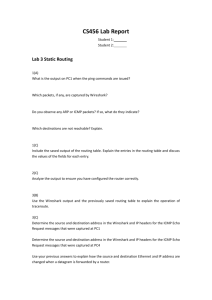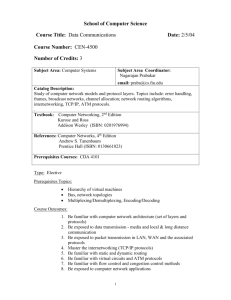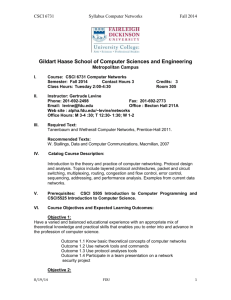CS 600.344 - Avi Rubin
advertisement
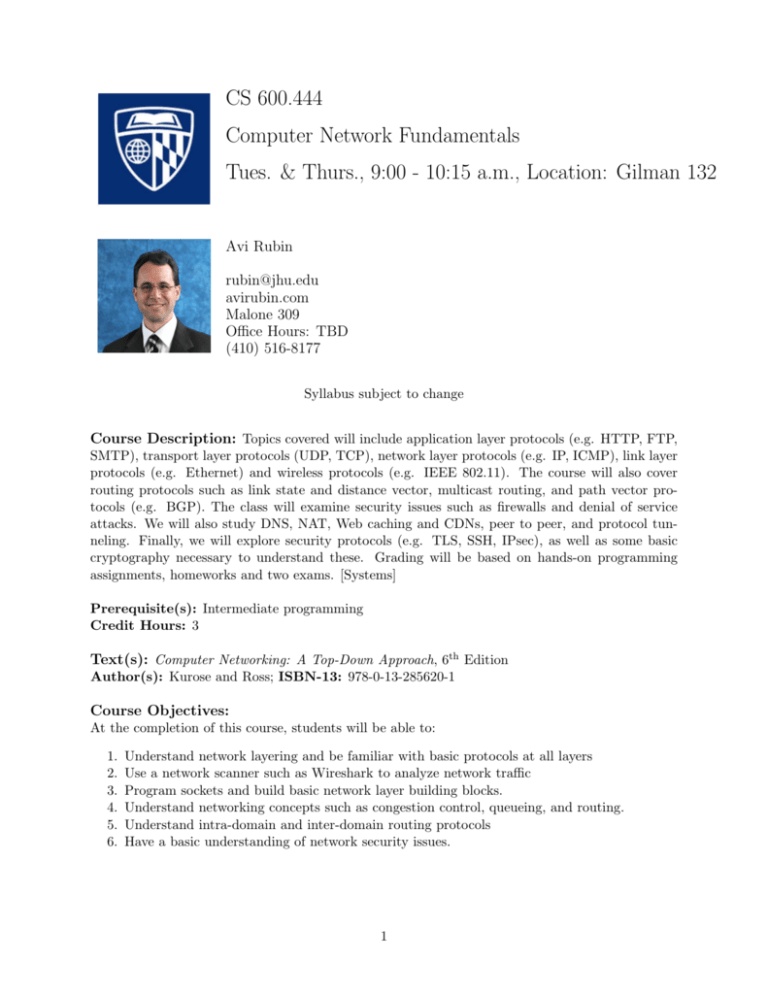
CS 600.444 Computer Network Fundamentals Tues. & Thurs., 9:00 - 10:15 a.m., Location: Gilman 132 Avi Rubin rubin@jhu.edu avirubin.com Malone 309 Office Hours: TBD (410) 516-8177 Syllabus subject to change Course Description: Topics covered will include application layer protocols (e.g. HTTP, FTP, SMTP), transport layer protocols (UDP, TCP), network layer protocols (e.g. IP, ICMP), link layer protocols (e.g. Ethernet) and wireless protocols (e.g. IEEE 802.11). The course will also cover routing protocols such as link state and distance vector, multicast routing, and path vector protocols (e.g. BGP). The class will examine security issues such as firewalls and denial of service attacks. We will also study DNS, NAT, Web caching and CDNs, peer to peer, and protocol tunneling. Finally, we will explore security protocols (e.g. TLS, SSH, IPsec), as well as some basic cryptography necessary to understand these. Grading will be based on hands-on programming assignments, homeworks and two exams. [Systems] Prerequisite(s): Intermediate programming Credit Hours: 3 Text(s): Computer Networking: A Top-Down Approach, 6th Edition Author(s): Kurose and Ross; ISBN-13: 978-0-13-285620-1 Course Objectives: At the completion of this course, students will be able to: 1. 2. 3. 4. 5. 6. Understand network layering and be familiar with basic protocols at all layers Use a network scanner such as Wireshark to analyze network traffic Program sockets and build basic network layer building blocks. Understand networking concepts such as congestion control, queueing, and routing. Understand intra-domain and inter-domain routing protocols Have a basic understanding of network security issues. 1 Grading: Labs Homework Assignments Programming Projects Exam 1 Exam 2 15% 15% 20% 25% 25% Letter Grade Distribution: Letter grades will be assigned on a curve. Computer Science Academic Integrity Code Cheating is wrong. Cheating hurts our community by undermining academic integrity, creating mistrust, and fostering unfair competition. The university will punish cheaters with failure on an assignment, failure in a course, permanent transcript notation, suspension, and/or expulsion. Offenses may be reported to medical, law or other professional or graduate schools when a cheater applies. Violations can include cheating on exams, plagiarism, reuse of assignments without permission, improper use of the Internet and electronic devices, unauthorized collaboration, alteration of graded assignments, forgery and falsification, lying, facilitating academic dishonesty, and unfair competition. Ignorance of these rules is not an excuse. Academic honesty is required in all work you submit to be graded. Except where the instructor specifies group work, you must solve all homework and programming assignments without the help of others. For example, you must not look at anyone else’s solutions (including program code) to your homework problems. However, you may discuss assignment specifications (not solutions) with others to be sure you understand what is required by the assignment. If your instructor permits using fragments of source code from outside sources, such as your textbook or on-line resources, you must properly cite the source. Not citing it constitutes plagiarism. Similarly, your group projects must list everyone who participated. Falsifying program output or results is prohibited. Your instructor is free to override parts of this policy for particular assignments. To protect yourself: (1) Ask the instructor if you are not sure what is permissible. (2) Seek help from the instructor, TA or CAs, as you are always encouraged to do, rather than from other students. (3) Cite any questionable sources of help you may have received. On every exam, you will sign the following pledge: ”I agree to complete this exam without unauthorized assistance from any person, materials or device. [Signed and dated]”. Your course instructors will let you know where to find copies of old exams, if they are available. For more information, see the guide on ”Academic Ethics for Undergraduates” and the Ethics Board web site (http://ethics.jhu.edu). 2 Tentative Course Outline: The weekly coverage might change as it depends on the progress of the class. However, you must keep up with the reading assignments. Week Content Week 1: 1/26, 1/28 • • • • Topic: Computer Networks & the Internet Reading assignment: Chapter 1 Lab: Wireshark Lab #1 assigned HW problems #1 assigned Week 2: 2/2, 2/4 • • • • • Topic: Application layer protocols, HTTP, FTP, SMTP, DNS Topic: Socket programming with UDP and TCP in Python Reading assignment: Chapter 2 HW problems #2 assigned Socket programming exercise assigned Week 3: 2/9, 2/11 • • • • Topic: Transport Layer Reading assignment: Chapter 3 HW problems #3 assigned Wireshark Labs on TCP and UDP assigned Week 4: 2/16, 2/18 • Topic: Network Layer part 1 • Topic: Routing, IP, Link state, Distance vector • Reading assignment: Chapter 4 Week 5: 3/1, 3/3 • • • • • Week 6: 3/8, 3/10 • Lecture catchup and review on 3/8 • Exam #1 on 3/10 Topic: Network layer part 2 Topic: Intra-AS, RIP, OSPT, Inter-AS, BGP, Broadcast, multicast Reading assignment: Chapter 4 HW problems #4 assigned Wireshark Labs IP, ICMP assigned SPRING BREAK 3 Week Content Week 7: 3/22, 3/24 • • • • • • Topic: Link Layer Topic: Error Detection and correction, Switched LANs, Link virtualization Reading assignment: Chapter 5 HW problems #5 assigned Wireshark Labs Ethernet, ARP, DHCP assigned ICMP Programming Exercise assigned Week 8: 3/29, 3/31 • • • • Topic: Wireless and Mobile Reading assignment: Chapter 6 HW problems #6 assigned Wireshark Labs IEEE 802.11 assigned Week 9: 4/5, 4/7 • Topic: Multimedia networking • Reading assignment: Chapter 7 • HW problems #6 assigned Week 10: 4/12, 4/14 • Topic: Security in computer networks • Topic: Crypto Principles, Message integrity, Authentication, IPsec, SSL, Wireless security • Reading assignment: Chapter 8 • HW problems #7 assigned • Wireshark Lab on SSL assigned Week 11: 4/19, 4/21 • • • • Week 12: 4/26, 4/28 • Lecture catchup and review on 4/26 • Exam #2 on 4/28 Topic: Network Management Topic: MIB, SNMP, Administration Reading assignment: Chapter 9 HW problems #8 assigned 4
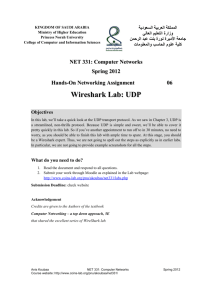
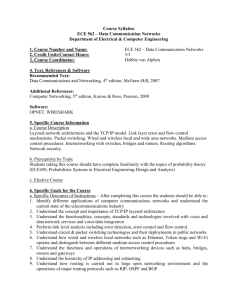
![Internetworking Technologies [Opens in New Window]](http://s3.studylib.net/store/data/007474950_1-04ba8ede092e0c026d6f82bb0c5b9cb6-300x300.png)

